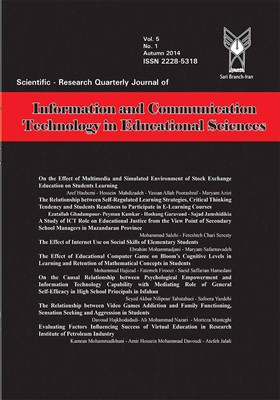The Effect of Internet Use on Social Skills of Elementary Students
Subject Areas :
Infomartion Technology
Ebrahim Mohammadjani
1
*
,
Maryam Safarnavadeh
2
1 - M.A in Primary Education, Allameh Tabatabaei University, Tehran, Iran
2 - Assistant Professor of Curriculum Planning, The University of Medical Sciences of Kerman, Kerman, Iran
Received: 2014-04-16
Accepted : 2014-10-16
Published : 2014-11-01
Keywords:
Internet,
sixth grade,
social skills,
male students,
Abstract :
The present research aimed to investigate the effect of the internet use on social skills of elementary school students. This study was based on semi-empirical, with pre-test and post-test method and control group. The statistical society was the total population of primary school male children in the sixth grade of Sarchehan Area including 185 people in the academic year 2013-2014. Using random cluster sampling method, a number of 120 cases were selected as sample. The measurement tool was a researcher-made questionnaire designed for social skills of the sixth grade elementary school students. Reliability of the test was 0.87 based on Cronbach alpha. Validity of the tool was confirmed by five psychology and education experts as well as applying 20 teachers and principals' opinions. The collected data were analyzed using t test and SPSS software. The results confirmed the main hypothesis that the internet use increased social skills of students. Moreover, the results revealed that internet use enhanced skills of respect for others, responsibility, friend making and group activities participation.
References:
Affonso, B., Morrison, M., & Krugman, D. M. (2002). Computers and related technologies and the impact on social interaction. Retrieved from www.iranculture.com (in Persian).
Ahmadi, P., Khademi, E., & Fatahibayat, S. (2009). Effects of new communication technologies (Internet, computer games and satellite) on social education, with a focus on adaptation in the second year high school students of Tehran. New Thoughts on Education, 3, 9-36. (in Persian).
Amirkafi, M. (2004). Sociological pattern of social isolation in Tehran. Unpublished PhD Thesis,Tarbiyat Modares University. (in Persian).
Castells, M. (2001). The Internet galaxy: Reflection on the Internet, business and society. New York. Oxford University Press.
Dehbozorgi, Gh. (1993). The effectiveness of social skills training on the adjustment of chronic schizophrenic patients in Iran. Unpublished Master's Thesis, Iran Medical University. Tehran Psychiatric Institute. (in Persian).
Duran, B. (2002). Impact on the identity of cybernetic space. Unpublished PhD Thesis, Tarbiyat Modares University. (in Persian).
Ebrahimi Ghavam, S. (1994). The relationship between the amount of social development, with emphasis on the types of social support, social skills. Ministry of Education, Institute of Education. (in Persian).
Gresham, F. M., Watson, T. S., & Skinner C. H. (2001). Functional behavioral assessment: Principles, procedures, and future directions. School Psychology Review, 30, 150-172.
Gustavo, M. (2002). Internet impact on the quality of the relationship between adolescent. Retrieved from www.iranculture.com (in Persian).
Harje, O., Saunders, D., & Dixon, D. (2005). Social skills in interpersonal communication (Translated by Khashayar Beygi & Firoozbakht). Tehran: Roshd Publications. (in Persian).
Hasanzadeh, R., Beydokhti, R., & Rezaei, A. (2012). The relationship between academic achievement and personality characteristics of learners with an Internet addiction. Journal of ICT in Education, 3(1), 95-107. (in Persian).
Kestnbaum, M., Robinson, J. P., Neustadtl, A., & Alvarez, A. (2002). Information technology and social time displacement. IT & Society, 1(1), 21-37.
Kiesler, S., Kraut, R., Cummings, J. B., Helgeson,V., & Crawford, A. (2002). Internet evolution and social Impact. IT & Society, 1(1), 120-134.
Kraut, R., Lundmark, V., Patterson, M., Kiesler, S., & Mukapadhyay, T. (1998). Internet paradox: A social technology that reduces social involvement and psychological well-being? Journal of American Psychologist, 53, 1017-1031.
McKenna, K. Y. A., & Bargh, J. A. (2000). Plan 9 from cyberspace: The implication of the internet for personality and social psychology. Personality and Social Psychology Reviw, 4(1), 57-75.
McQuail, D. (2005). McQuails Mass Communication Theory (5th edition). London: Sage Publications.
Mohseni, M., Duran, B., & Sohrabi, M. H. (2006). Effects of Internet use on social isolation of Internet users (Café Net Users in Tehran). Iranian Journal of Sociology, 28, 72-95. (in Persian).
Poorshahriyari, M. (2005). Comparison of depression, social isolation and family connections of users and non-users of the Internet in high school girl students in Tehran. Psychological Studies, 3(2), 49-64. (in Persian)
Sarrafizadeh, A. (2007). Information technology in Organization. Tehran: Mir Publications. (in Persian).
Watt, D., & White, J. M. (1999) Computers and the family life. Comprative Family Studies, 30(1), 1-15.
Wellman, B., Boase, J., & Chen, W. (2002). The network nature of community: Online and offline. Review Quarterly Journal of IT & Society, 1(1), 151-165.
Yamauchi,Y., & Coget, J-F. (2002). Untangling the social impact of the Internet: A larg- scale survey. Retrieved from www.anderson.ucla.edu
Yosefi, F., & Mokhir, M. (2002). Matson evaluation of social skills inventory to measure and compare the performance of boys and girls high school in the scale. Review Quarterly Journal of Applied Psychology, 18(2), 48-57. (in Persian).
Zamani, B., Abedini, Y., & Kalantari, M. (2013). Achievement levels of boys and girls how to use the Internet at school. Review Quarterly Journal of Applied Psychology, 3(27), 85-101. (in Persian).

